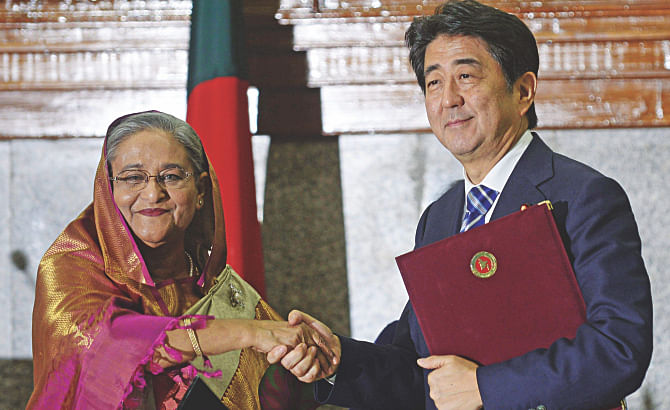Dhaka quits UN race for Tokyo

In a major policy decision in favour of Japan, Bangladesh has withdrawn its candidature for a non-permanent seat on the UN Security Council for 2016-17.
Prime Minister Sheikh Hasina declared this yesterday in a joint press announcement with her Japanese counterpart Shinzo Abe at the former's office yesterday afternoon.
“… in view of Japan's continued and strong support for Bangladesh's development process, and in the solidarity and unity of the Asia-Pacific Group at the UN, it is my pleasure to declare that Bangladesh will support Japan's candidature from the Group.
“We also withdraw Bangladesh's candidature in favour of Japan,” said Hasina.
"We recall with deep gratitude the support and empathy of the friendly people and the government of Japan during our Liberation War," she said.
Welcoming Bangladesh's decision, Japanese Prime Minister Abe, who arrived in Dhaka yesterday on a brief but significant tour, expressed his gratefulness to the Bangladesh premier for her wholehearted cooperation.
"I am deeply grateful to Sheikh Hasina for the decision to withdraw candidature for a non-permanent seat on the UN Security Council and extending support to Japan for the post," he said.
Abe said he and his country highly appreciate the decision, and it will be instrumental in further strengthening the bilateral relations that have entered a new dimension.
"It will also enhance bilateral cooperation in the international arena," he added.
Dhaka's announcement came after “fruitful” official talks in which Hasina and Abe led their sides.
There were speculations that the Japanese PM might pledge further economic assistance following Dhaka's withdrawal of candidacy.
But that didn't happen. Abe reiterated his earlier commitment to provide up to 600 billion Yen ($5.71 billion) in additional assistance to Bangladesh in about four to five years from 2014.
Abe had announced this financial assistance on May 26 during Hasina's visit to Japan.
Referring to Abe's commitment of an additional $6 billion in official development assistance (ODA), Hasina said, “We understand the Japanese commitment would not be limited to the amount.”
In that context, she said Japan launched a programme for Bangladesh under the “Bay of Bengal Industrial Growth Belt (BIG-B)” to help it achieve economic development through improvement of investment climate and infrastructure.
Hasina also expressed Bangladesh's readiness to contribute to Japan's construction, health and nursing sectors.
Turning to Japan-Bangladesh cooperation in international affairs, she said Japan has always been supportive of Bangladesh's role in the UN peacekeeping and peace-building.
The Bangladesh PM said Japan offered technical assistance in setting up a “Peace Building Centre” in Dhaka and preliminary work for it had already started.
“We deeply appreciate Japan's offer for this cooperation as well as Japan's commitment and contribution to establishing and maintaining global peace and stability,” said Hasina.
Bangladesh was elected twice to a non-permanent seat on the UNSC for 1979-1980 and 1999-2000 with overwhelming support from its global friends.
As per the UN system, only one member state from the Asia Pacific region can win each election for the non-permanent UNSC seat.
In 2002, Dhaka launched a fresh bid for the seat for 2016-17 from the Asia Pacific Group. In 2011, Japan also announced its candidacy from the same group.
The Bangladesh PM said the two governments have been in close touch for upholding mutual cooperation and group solidarity in multilateral forums.
At the talks at the Prime Minister's Office, Hasina and Abe agreed to widen bilateral relations under the framework of “comprehensive partnership” and boost bilateral trade and investment.
Acknowledging the imperative and benefits of trade and investment, Abe said location, competitive incentives, improvement of infrastructure and labour supply are critical factors for Special Economic Zones.
He stressed the need for improving services rendered by Bangladesh's foreign investment regulatory authorities and making serious efforts to ensure stable supply of primary energy and power to industries.
In response, the Bangladesh PM directed the authorities concerned to address these issues as soon as possible.
All these have been incorporated in the 3,084-word joint statement issued after the hour-long bilateral talks between the two leaders.
The two premiers said both countries have the same view on economic cooperation to be pursued under the BIG-B initiative, and put emphasis on strengthening collaboration and cooperation in project formulation and implementation.
They hoped the BIG-B initiative, with maximum use of Japan's advanced technologies, would contribute to mutual benefits and prosperity of the two countries.
The three pillars of the BIG-B initiative are development of economic infrastructure, improvement of investment environment, and fostering of connectivity.
The two leaders shared their intentions to continue cooperation in the areas of transport network improvement, stable power supply, economic zone development, and private sector development such as financial accessibility promotion.
At the joint press announcement, Hasina presented Abe an album with pictures of two Bengal Tigers while Abe handed over to Hasina a box containing Bangladeshi and Japanese coins.
For the first time, Japanese mint made Bangladeshi coins with the image of the father of the nation Bangabandhu Sheikh Mujibur Rahman.
Earlier, the Japanese PM paid rich tributes to the Liberation War martyrs, placing wreaths at the national memorial in Savar.
Later, he went to Bangabandhu Memorial Museum at Dhanmondi to pay respect to the father of the nation around 3:00pm.
Abe and his 150-member entourage, including his wife Akei Abe, arrived in Dhaka around 1:00pm yesterday.
The Japanese premier will visit the Institute of Fine Arts at Dhaka University today morning.
He is due to leave Dhaka for Colombo at 10:30am.

 For all latest news, follow The Daily Star's Google News channel.
For all latest news, follow The Daily Star's Google News channel. 



Comments